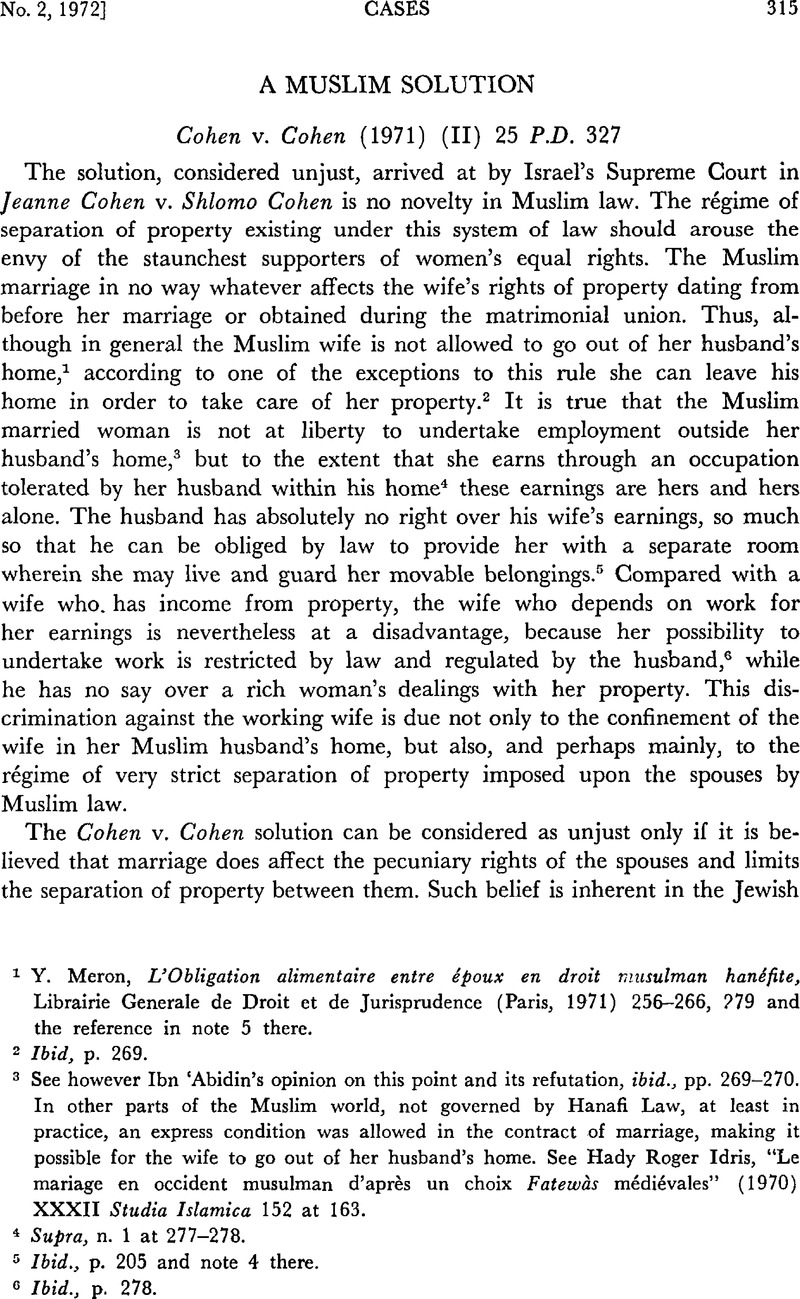No CrossRef data available.

1 Meron, Y., L'Obligation alimentaire entre époux en droit musulman hanéfite, Librairie Generale de Droit et de Jurisprudence (Paris, 1971) 256–266, ?79Google Scholar and the reference in note 5 there.
2 Ibid., p. 269.
3 See however Ibn ‘Abidin's opinion on this point and its refutation, ibid., pp. 269–270. In other parts of the Muslim world, not governed by Hanafi Law, at least in practice, an express condition was allowed in the contract of marriage, making it possible for the wife to go out of her husband's home. See Idris, Hady Roger, “Le manage en occident musulman d'après un choix Fatewàs médiévales” (1970) XXXII Studia Islamica 152 at 163.Google Scholar
4 Supra, n. 1 at 277–278.
5 Ibid., p. 205 and note 4 there.
6 Ibid., p. 278.
7 Per the then Permanent Vice President of the Supreme Court, Silberg, J. in Shtreit v. The Chief Rabbi of Israel (1963) 17 P.D. 604, 622.Google Scholar
8 See: Laysh, A., “The Religious Jurisdiction of the Muslims in Israel” (1963) 13 Ha-Mizrah He-Hadash, Quarterly of the Israel Oriental Society, 19 at 25.Google Scholar See also the obiter remark of Kister, J. in Seguev and Reichart v. The Rabbinical Court and the Chief Rabbinate of Safed (1967) (II) 21 P.D. 505, 558–559.Google Scholar It is therefore totally unfounded to maintain that “the other” non-Jewish “ethnic non-religious groups residing in the country” welcome secular intervention in their religious laws, as claimed by Doukhan-Landau, Leah, “Husband and Wife as Co-owners of Immovable Property” (1971) 6 Is.L.R. 487 at 499.Google Scholar
9 See: Meron, Y., “Muslim Polygamy and the Constitutionality of its Prohibition” in (1972) 3 Mishpatim.Google Scholar
10 Per the President of the Supreme Court, Agranat J., p. 335A: “This is a matter for the legislator to deal with”; p. 335F “The intervention of the legislator is necessary”.
11 (1960) 14 P.D. 285.
12 (1958) 12 P.D. 1528.
13 Dr.Schereschewsky, B., Family Law In Israel (Jerusalem, 1st ed., 1958) 205–7, and note 18 at 218–9.Google Scholar Also see id., (2nd ed., 1967) and id. (3rd ed., 1971) 216.
14 45 & 46 Vict. C. 75.
15 Biberfeld v. Biberfeld (1952) 2 Q.B. 770, 782–783.
16 Ibid., p. 287, beginning of sec. 3.
17 The outright rejection of Jewish law, advocated by Haim Cohn J. inter alia in Cohen v. Cohen, is undoubtedly the soundest course for the legislator to take, if it decides to interfere with this religious law. This was Haim Cohn J.'s position also in Rufeizen v. The Minister of Interior (1962) (IV) 16 P.D. 2428, 2440F, 2443A. It has been fully vindicated in the majority opinion in Shalit v. The Minister of Interior et al. (1969) (II) 23 P.D. 477–608. But the Law of Return (Amendment No. 2) (1970) Sefer HaHukim 586, shows that the legislator is not ready to condone, let alone initiate, such drastic measures.